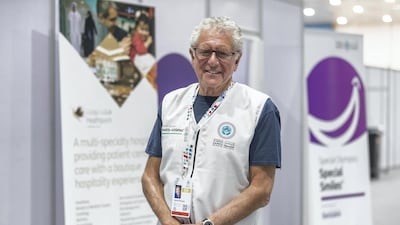Described as the forgotten Kennedy, Rosemary Kennedy, who suffered from an intellectual disability, was subjected to a barbaric lobotomy while she was awake at the young age of 23.
The procedure left her disabled, unable to talk or move and while she was hidden away for years, it is her tragedy that inspired what is today the Special Olympic Games' Healthy Athlete programme.
Decades later, governments are laying down laws to ensure that all people with intellectual disabilities get the basic right of access to healthcare.
On Monday, Dr Steven Perlman, dentist, founder of the Healthy Athlete programme and global clinical advisor, recalled how one athlete once almost died from a tooth infection and was rushed to the hospital.
“It drives me crazy,” he said. “This shouldn’t be happening. Do you have an idea how much pain he must have been in?"
“An infection like this doesn’t develop overnight. It takes years.”
The athlete had come to the clinic to complain of an ear ache. “He had been in so much pain for years that it became normal,” said Dr Pelrman. “He came in with severe swelling in his face and couldn’t even open his mouth. The tooth was so infected that they couldn’t even remove it.”
The screening programme also allowed 20-year-old Côte d'Ivoire athlete Yann Beugre to hear for the first time after installing him with a hearing aid.
“His family could never afford to get him a hearing aid so he couldn’t hear or speak,” said the team’s manager, Doyn Ali, who said she was in tears watching Yann respond to sound for the first time in his life.
According to studies in the UK, the life expectancy of a male with an intellectual disability is 13 years less than those without, while for a woman it is 20 years less. “But you don’t die of your intellectual disability. You die from preventable medical conditions such as heart disease, bowel obstruction diabetes and so on,” said Dr Perlmen.
The Special Olympics Games was founded by Eunice Kennedy Shriver, the sister of Rosemary. To calm Rosemary’s mood swings, her family, ill-advised at the time, agreed to a lobotomy. Her story is one of America’s biggest tragedies.
“After the lobotomy, the family hid her away in Wisconsin. She was getting the best healthcare that money could buy, obviously, because she is a Kennedy,” Dr Perlmen said.
At one point, dentists decided that Rosemary should have all her teeth removed “but they couldn’t do it because her legal guardian, Eunice Kennedy, refused.”
Instead, she searched the country for a dentist skilled at dealing with people with disabilities. They finally found Dr Perlman, who was based in Boston some 2,000 miles away.
“It was sad. She was 63 and I am a paediatric specialist,” he said.
“When I finished the case, Mrs Shriver wanted to meet me and thank me so she brought me to Washington DC. When she met me she said, 'I want to thank you, but I also want you to teach me about dental problems for people with intellectual disabilities.' I responded, 'I don’t want to talk about dental problems, I want to talk about the health problems of people with intellectual disabilities.'
“I had thought the government took care of it,” said Eunice.
______________
Read more:
Abu Dhabi welcomes Special Olympics athletes to 'the willpower nation'
The Special Olympics are testament to the UAE's inclusivity for people like me
UAE sprinters challenge perception that Arabs don’t play sport
______________
Eunice asked Dr Perlmen to help improve the health of people with intellectual disabilities and so he piloted the Healthy Athletes program.
“We are changing systems,” he said; however, one of the greatest barriers is training healthcare professional such as nurses, dentists, nutritionists and gynaecologists.
While the University of Sharjah two years ago introduced a dental programme for treating people with disabilities, there are less than five trained specialised dentists in the UAE, said Dr Shadi AlKhatib, lecturer in dental medicine at the university of Sharjah.
Yet all of the athletes screened this year had dental problems that ranged from cavities, infections and missing teeth.
“The treatment of people with disabilities is difficult and it is very risky to sedate them. Oral health is the most unmet need of people with disabilities because most of the time they are poor. The whole issue is that people think that those with disabilities are being taken care of by the Government. Well, the Government doesn’t take care of them ... Physicians, dentists, nurses have no training.”
He says, however, there has been some progress. “In the UAE, I am told that people with disabilities are generally not visible in public and I think this is the reason the UAE wanted this bid – to change that,” he said.

